
The Project Gutenberg EBook of A Connecticut Yankee in King Arthur's Court, Part 9., by Mark Twain (Samuel Clemens) This eBook is for the use of anyone anywhere at no cost and with almost no restrictions whatsoever. You may copy it, give it away or re-use it under the terms of the Project Gutenberg License included with this eBook or online at www.gutenberg.org Title: A Connecticut Yankee in King Arthur's Court, Part 9. Author: Mark Twain (Samuel Clemens) Release Date: July 7, 2004 [EBook #7250] Language: English Character set encoding: ISO-8859-1 *** START OF THIS PROJECT GUTENBERG EBOOK CONNECTICUT YANKEE *** Produced by David Widger

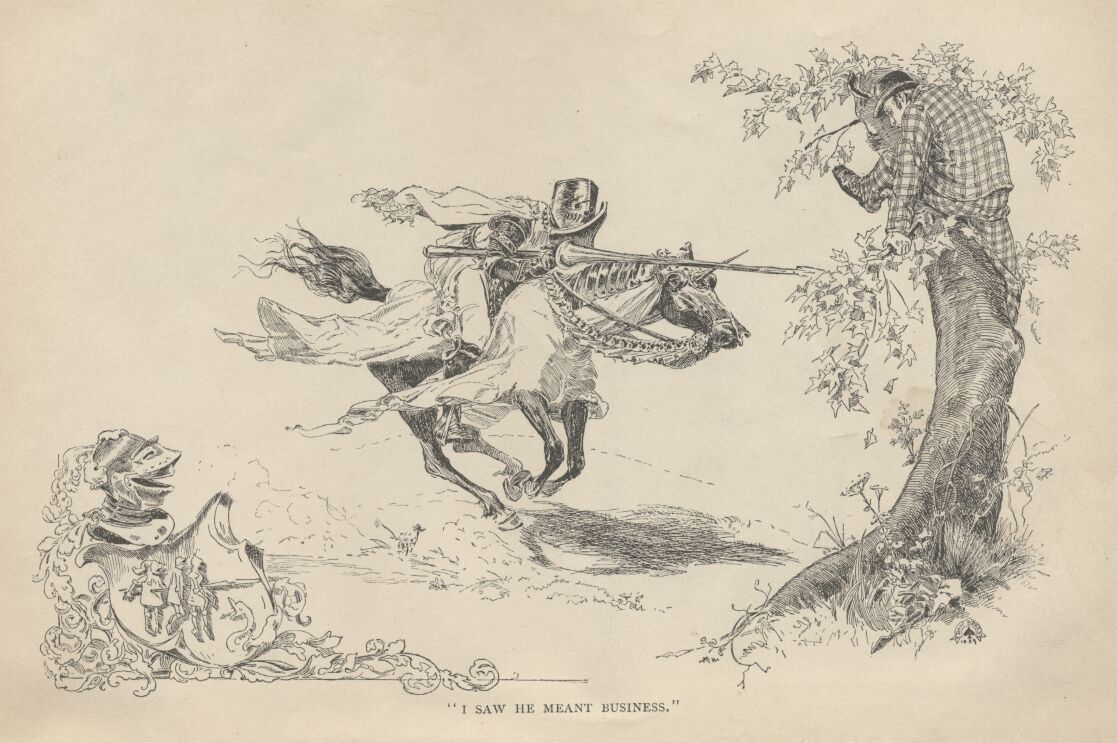

| CHAPTER XLI. | THE INTERDICT |
| CHAPTER XLII. | WAR! |
| CHAPTER XLIII. | THE BATTLE OF THE SAND-BELT |
| CHAPTER XLIV. | A POSTSCRIPT BY CLARENCE |
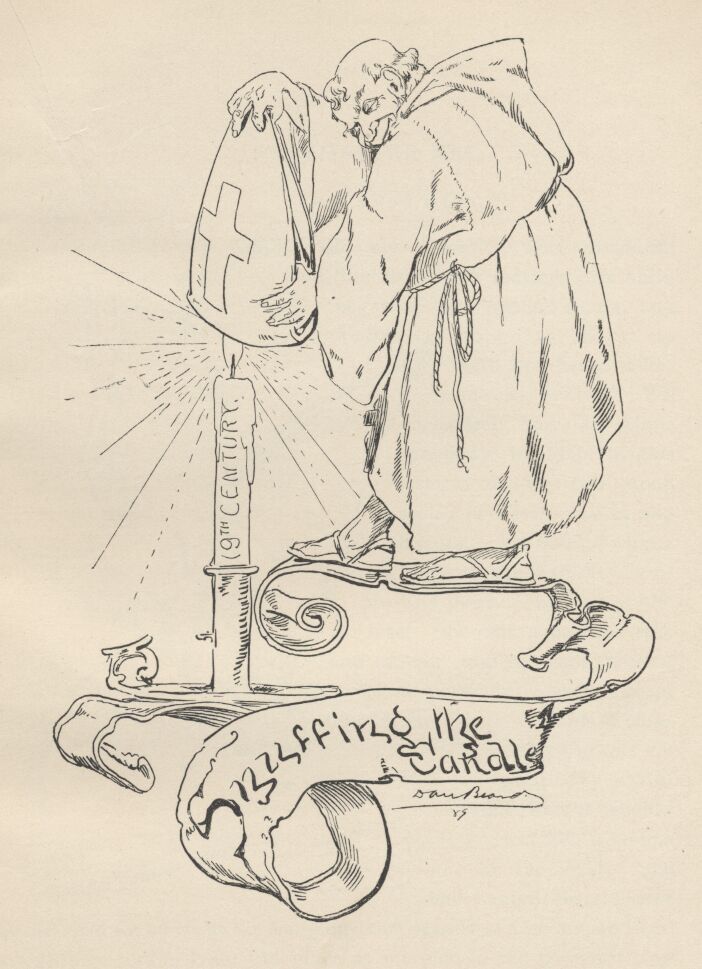
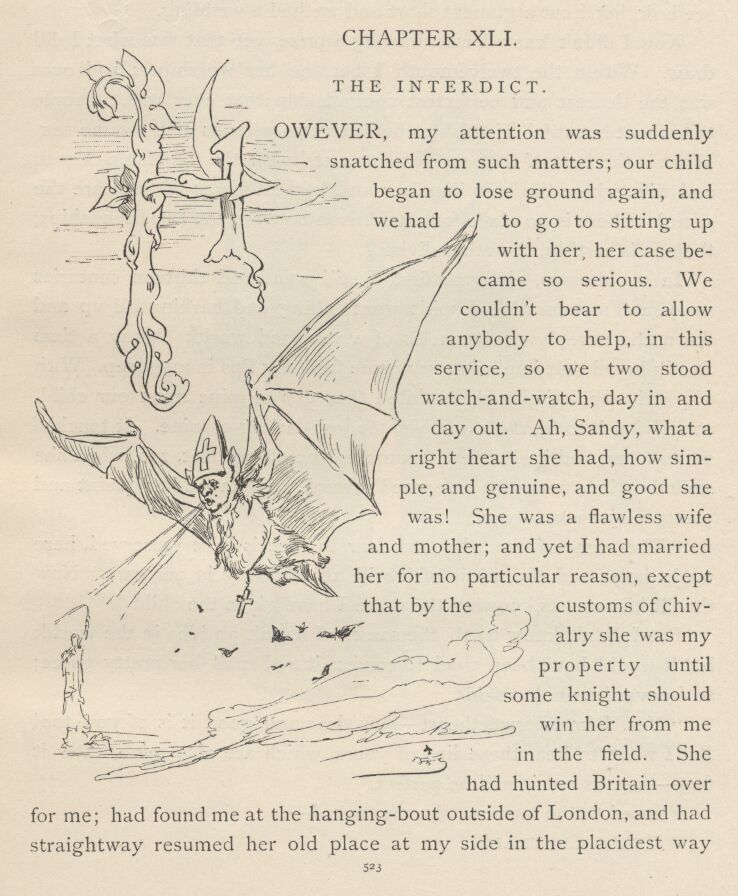
THE INTERDICT
However, my attention was suddenly snatched from such matters; our child began to lose ground again, and we had to go to sitting up with her, her case became so serious. We couldn't bear to allow anybody to help in this service, so we two stood watch-and-watch, day in and day out. Ah, Sandy, what a right heart she had, how simple, and genuine, and good she was! She was a flawless wife and mother; and yet I had married her for no other particular reasons, except that by the customs of chivalry she was my property until some knight should win her from me in the field. She had hunted Britain over for me; had found me at the hanging-bout outside of London, and had straightway resumed her old place at my side in the placidest way and as of right. I was a New Englander, and in my opinion this sort of partnership would compromise her, sooner or later. She couldn't see how, but I cut argument short and we had a wedding.
Now I didn't know I was drawing a prize, yet that was what I did draw. Within the twelvemonth I became her worshiper; and ours was the dearest and perfectest comradeship that ever was. People talk about beautiful friendships between two persons of the same sex. What is the best of that sort, as compared with the friendship of man and wife, where the best impulses and highest ideals of both are the same? There is no place for comparison between the two friendships; the one is earthly, the other divine.
In my dreams, along at first, I still wandered thirteen centuries away, and my unsatisfied spirit went calling and harking all up and down the unreplying vacancies of a vanished world. Many a time Sandy heard that imploring cry come from my lips in my sleep. With a grand magnanimity she saddled that cry of mine upon our child, conceiving it to be the name of some lost darling of mine. It touched me to tears, and it also nearly knocked me off my feet, too, when she smiled up in my face for an earned reward, and played her quaint and pretty surprise upon me:
"The name of one who was dear to thee is here preserved, here made holy, and the music of it will abide alway in our ears. Now thou'lt kiss me, as knowing the name I have given the child."
But I didn't know it, all the same. I hadn't an idea in the world; but it would have been cruel to confess it and spoil her pretty game; so I never let on, but said:
"Yes, I know, sweetheart—how dear and good it is of you, too! But I want to hear these lips of yours, which are also mine, utter it first—then its music will be perfect."
Pleased to the marrow, she murmured:
"HELLO-CENTRAL!"
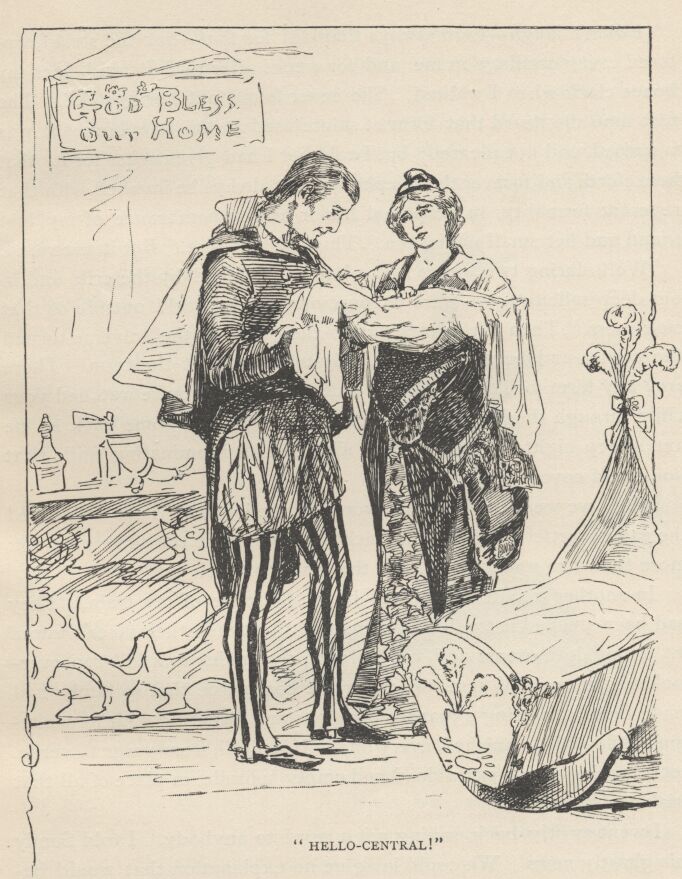
I didn't laugh—I am always thankful for that—but the strain ruptured every cartilage in me, and for weeks afterward I could hear my bones clack when I walked. She never found out her mistake. The first time she heard that form of salute used at the telephone she was surprised, and not pleased; but I told her I had given order for it: that henceforth and forever the telephone must always be invoked with that reverent formality, in perpetual honor and remembrance of my lost friend and her small namesake. This was not true. But it answered.
Well, during two weeks and a half we watched by the crib, and in our deep solicitude we were unconscious of any world outside of that sick-room. Then our reward came: the center of the universe turned the corner and began to mend. Grateful? It isn't the term. There isn't any term for it. You know that yourself, if you've watched your child through the Valley of the Shadow and seen it come back to life and sweep night out of the earth with one all-illuminating smile that you could cover with your hand.
Why, we were back in this world in one instant! Then we looked the same startled thought into each other's eyes at the same moment; more than two weeks gone, and that ship not back yet!
In another minute I appeared in the presence of my train. They had been steeped in troubled bodings all this time—their faces showed it. I called an escort and we galloped five miles to a hilltop overlooking the sea. Where was my great commerce that so lately had made these glistening expanses populous and beautiful with its white-winged flocks? Vanished, every one! Not a sail, from verge to verge, not a smoke-bank—just a dead and empty solitude, in place of all that brisk and breezy life.
I went swiftly back, saying not a word to anybody. I told Sandy this ghastly news. We could imagine no explanation that would begin to explain. Had there been an invasion? an earthquake? a pestilence? Had the nation been swept out of existence? But guessing was profitless. I must go—at once. I borrowed the king's navy—a "ship" no bigger than a steam launch—and was soon ready.
The parting—ah, yes, that was hard. As I was devouring the child with last kisses, it brisked up and jabbered out its vocabulary!—the first time in more than two weeks, and it made fools of us for joy. The darling mispronunciations of childhood!—dear me, there's no music that can touch it; and how one grieves when it wastes away and dissolves into correctness, knowing it will never visit his bereaved ear again. Well, how good it was to be able to carry that gracious memory away with me!
I approached England the next morning, with the wide highway of salt water all to myself. There were ships in the harbor, at Dover, but they were naked as to sails, and there was no sign of life about them. It was Sunday; yet at Canterbury the streets were empty; strangest of all, there was not even a priest in sight, and no stroke of a bell fell upon my ear. The mournfulness of death was everywhere. I couldn't understand it. At last, in the further edge of that town I saw a small funeral procession—just a family and a few friends following a coffin—no priest; a funeral without bell, book, or candle; there was a church there close at hand, but they passed it by weeping, and did not enter it; I glanced up at the belfry, and there hung the bell, shrouded in black, and its tongue tied back. Now I knew! Now I understood the stupendous calamity that had overtaken England. Invasion? Invasion is a triviality to it. It was the INTERDICT!
I asked no questions; I didn't need to ask any. The Church had struck; the thing for me to do was to get into a disguise, and go warily. One of my servants gave me a suit of clothes, and when we were safe beyond the town I put them on, and from that time I traveled alone; I could not risk the embarrassment of company.
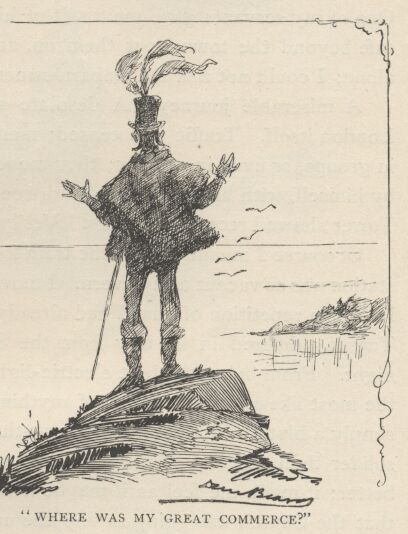
A miserable journey. A desolate silence everywhere. Even in London itself. Traffic had ceased; men did not talk or laugh, or go in groups, or even in couples; they moved aimlessly about, each man by himself, with his head down, and woe and terror at his heart. The Tower showed recent war-scars. Verily, much had been happening.
Of course, I meant to take the train for Camelot. Train! Why, the station was as vacant as a cavern. I moved on. The journey to Camelot was a repetition of what I had already seen. The Monday and the Tuesday differed in no way from the Sunday. I arrived far in the night. From being the best electric-lighted town in the kingdom and the most like a recumbent sun of anything you ever saw, it was become simply a blot—a blot upon darkness—that is to say, it was darker and solider than the rest of the darkness, and so you could see it a little better; it made me feel as if maybe it was symbolical—a sort of sign that the Church was going to keep the upper hand now, and snuff out all my beautiful civilization just like that. I found no life stirring in the somber streets. I groped my way with a heavy heart. The vast castle loomed black upon the hilltop, not a spark visible about it. The drawbridge was down, the great gate stood wide, I entered without challenge, my own heels making the only sound I heard—and it was sepulchral enough, in those huge vacant courts.
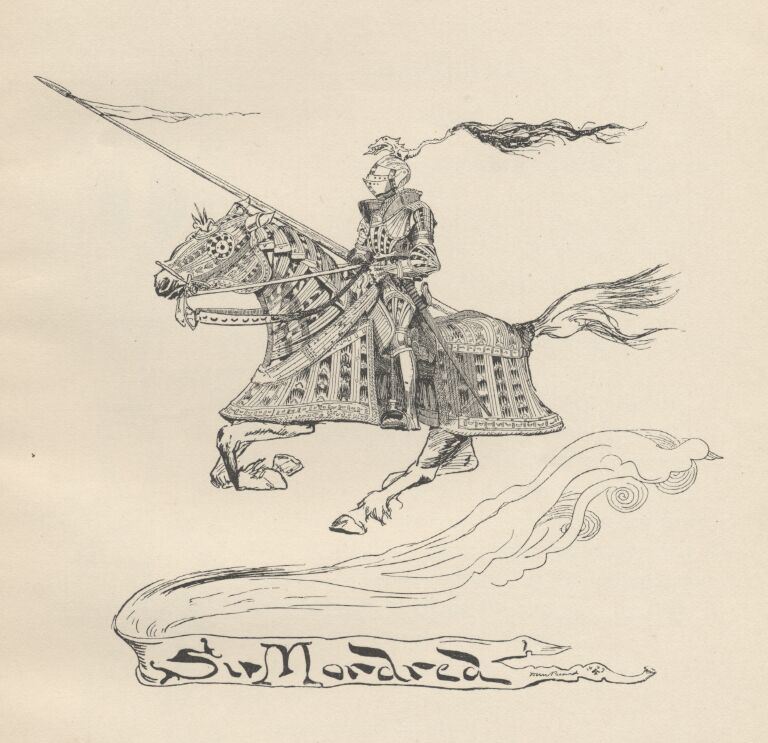
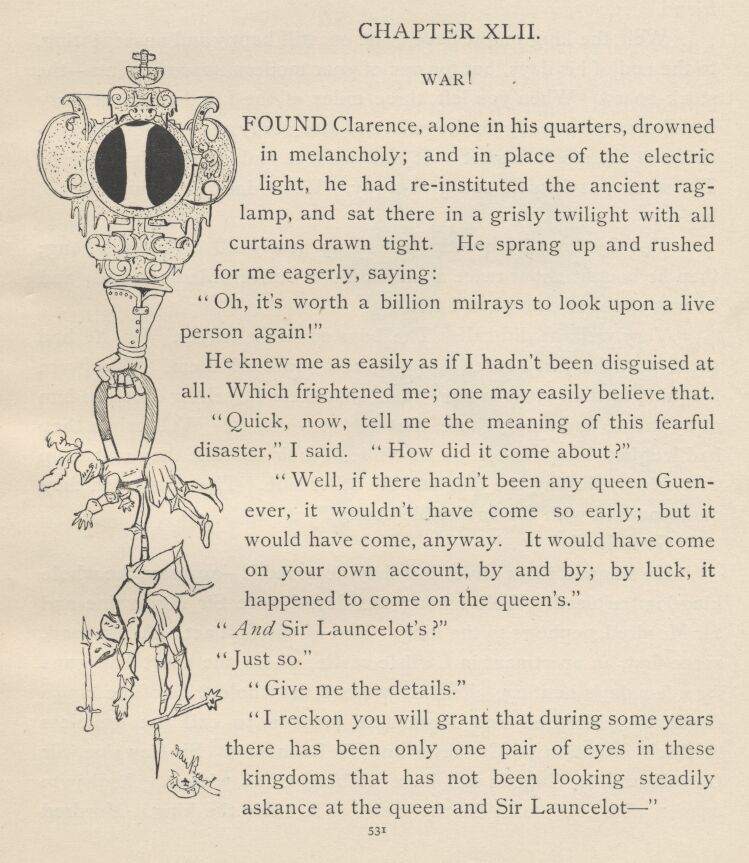
WAR!
I found Clarence alone in his quarters, drowned in melancholy; and in place of the electric light, he had reinstituted the ancient rag-lamp, and sat there in a grisly twilight with all curtains drawn tight. He sprang up and rushed for me eagerly, saying:
"Oh, it's worth a billion milrays to look upon a live person again!"
He knew me as easily as if I hadn't been disguised at all. Which frightened me; one may easily believe that.
"Quick, now, tell me the meaning of this fearful disaster," I said. "How did it come about?"
"Well, if there hadn't been any Queen Guenever, it wouldn't have come so early; but it would have come, anyway. It would have come on your own account by and by; by luck, it happened to come on the queen's."
"And Sir Launcelot's?"
"Just so."
"Give me the details."
"I reckon you will grant that during some years there has been only one pair of eyes in these kingdoms that has not been looking steadily askance at the queen and Sir Launcelot—"
"Yes, King Arthur's."
"—and only one heart that was without suspicion—"
"Yes—the king's; a heart that isn't capable of thinking evil of a friend."
"Well, the king might have gone on, still happy and unsuspecting, to the end of his days, but for one of your modern improvements—the stock-board. When you left, three miles of the London, Canterbury and Dover were ready for the rails, and also ready and ripe for manipulation in the stock-market. It was wildcat, and everybody knew it. The stock was for sale at a give-away. What does Sir Launcelot do, but—"
"Yes, I know; he quietly picked up nearly all of it for a song; then he bought about twice as much more, deliverable upon call; and he was about to call when I left."
"Very well, he did call. The boys couldn't deliver. Oh, he had them—and he just settled his grip and squeezed them. They were laughing in their sleeves over their smartness in selling stock to him at 15 and 16 and along there that wasn't worth 10. Well, when they had laughed long enough on that side of their mouths, they rested-up that side by shifting the laugh to the other side. That was when they compromised with the Invincible at 283!"
"Good land!"
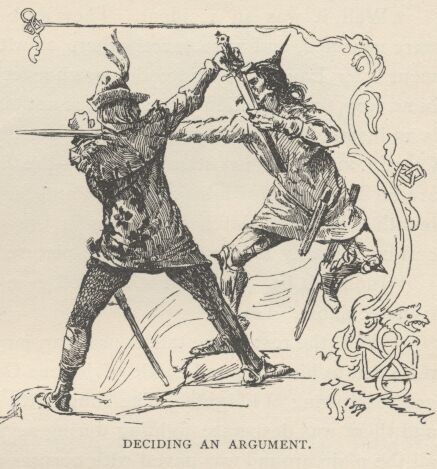
"He skinned them alive, and they deserved it—anyway, the whole kingdom rejoiced. Well, among the flayed were Sir Agravaine and Sir Mordred, nephews to the king. End of the first act. Act second, scene first, an apartment in Carlisle castle, where the court had gone for a few days' hunting. Persons present, the whole tribe of the king's nephews. Mordred and Agravaine propose to call the guileless Arthur's attention to Guenever and Sir Launcelot. Sir Gawaine, Sir Gareth, and Sir Gaheris will have nothing to do with it. A dispute ensues, with loud talk; in the midst of it enter the king. Mordred and Agravaine spring their devastating tale upon him. Tableau . A trap is laid for Launcelot, by the king's command, and Sir Launcelot walks into it. He made it sufficiently uncomfortable for the ambushed witnesses—to wit, Mordred, Agravaine, and twelve knights of lesser rank, for he killed every one of them but Mordred; but of course that couldn't straighten matters between Launcelot and the king, and didn't."
"Oh, dear, only one thing could result—I see that. War, and the knights of the realm divided into a king's party and a Sir Launcelot's party."
"Yes—that was the way of it. The king sent the queen to the stake, proposing to purify her with fire. Launcelot and his knights rescued her, and in doing it slew certain good old friends of yours and mine—in fact, some of the best we ever had; to wit, Sir Belias le Orgulous, Sir Segwarides, Sir Griflet le Fils de Dieu, Sir Brandiles, Sir Aglovale—"
"Oh, you tear out my heartstrings."
"—wait, I'm not done yet—Sir Tor, Sir Gauter, Sir Gillimer—"
"The very best man in my subordinate nine. What a handy right-fielder he was!"
"—Sir Reynold's three brothers, Sir Damus, Sir Priamus, Sir Kay the Stranger—"
"My peerless short-stop! I've seen him catch a daisy-cutter in his teeth. Come, I can't stand this!"
"—Sir Driant, Sir Lambegus, Sir Herminde, Sir Pertilope, Sir Perimones, and—whom do you think?"
"Rush! Go on."
"Sir Gaheris, and Sir Gareth—both!"
"Oh, incredible! Their love for Launcelot was indestructible."
"Well, it was an accident. They were simply onlookers; they were unarmed, and were merely there to witness the queen's punishment. Sir Launcelot smote down whoever came in the way of his blind fury, and he killed these without noticing who they were. Here is an instantaneous photograph one of our boys got of the battle; it's for sale on every news-stand. There—the figures nearest the queen are Sir Launcelot with his sword up, and Sir Gareth gasping his latest breath. You can catch the agony in the queen's face through the curling smoke. It's a rattling battle-picture."
"Indeed, it is. We must take good care of it; its historical value is incalculable. Go on."
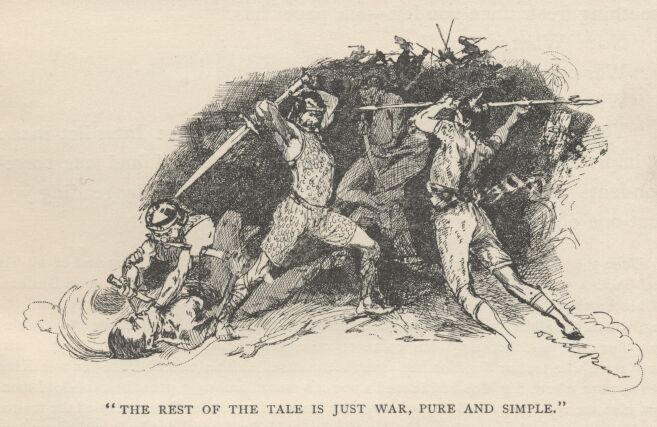
"Well, the rest of the tale is just war, pure and simple. Launcelot retreated to his town and castle of Joyous Gard, and gathered there a great following of knights. The king, with a great host, went there, and there was desperate fighting during several days, and, as a result, all the plain around was paved with corpses and cast-iron. Then the Church patched up a peace between Arthur and Launcelot and the queen and everybody—everybody but Sir Gawaine. He was bitter about the slaying of his brothers, Gareth and Gaheris, and would not be appeased. He notified Launcelot to get him thence, and make swift preparation, and look to be soon attacked. So Launcelot sailed to his Duchy of Guienne with his following, and Gawaine soon followed with an army, and he beguiled Arthur to go with him. Arthur left the kingdom in Sir Mordred's hands until you should return—"
"Ah—a king's customary wisdom!"
"Yes. Sir Mordred set himself at once to work to make his kingship permanent. He was going to marry Guenever, as a first move; but she fled and shut herself up in the Tower of London. Mordred attacked; the Bishop of Canterbury dropped down on him with the Interdict. The king returned; Mordred fought him at Dover, at Canterbury, and again at Barham Down. Then there was talk of peace and a composition. Terms, Mordred to have Cornwall and Kent during Arthur's life, and the whole kingdom afterward."
"Well, upon my word! My dream of a republic to be a dream, and so remain."
"Yes. The two armies lay near Salisbury. Gawaine—Gawaine's head is at Dover Castle, he fell in the fight there—Gawaine appeared to Arthur in a dream, at least his ghost did, and warned him to refrain from conflict for a month, let the delay cost what it might. But battle was precipitated by an accident. Arthur had given order that if a sword was raised during the consultation over the proposed treaty with Mordred, sound the trumpet and fall on! for he had no confidence in Mordred. Mordred had given a similar order to his people. Well, by and by an adder bit a knight's heel; the knight forgot all about the order, and made a slash at the adder with his sword. Inside of half a minute those two prodigious hosts came together with a crash! They butchered away all day. Then the king—however, we have started something fresh since you left—our paper has."
"No? What is that?"
"War correspondence!"
"Why, that's good."
"Yes, the paper was booming right along, for the Interdict made no impression, got no grip, while the war lasted. I had war correspondents with both armies. I will finish that battle by reading you what one of the boys says:
|
'Then the king looked about him, and then was he |
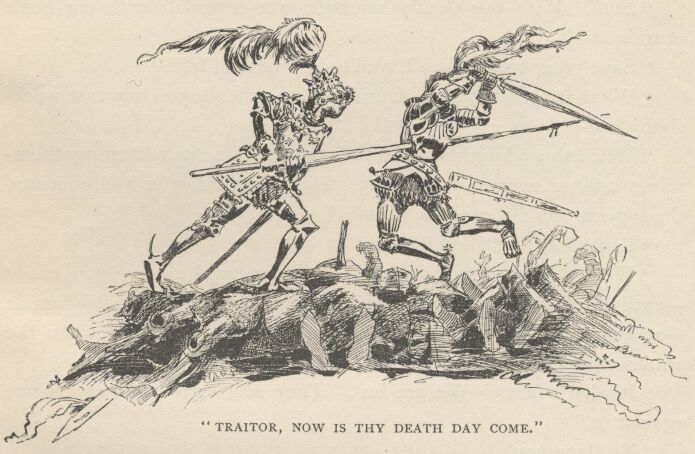
"That is a good piece of war correspondence, Clarence; you are a first-rate newspaper man. Well—is the king all right? Did he get well?"
"Poor soul, no. He is dead."
I was utterly stunned; it had not seemed to me that any wound could be mortal to him.
"And the queen, Clarence?"
"She is a nun, in Almesbury."
"What changes! and in such a short while. It is inconceivable. What next, I wonder?"
"I can tell you what next."
"Well?"
"Stake our lives and stand by them!"
"What do you mean by that?"
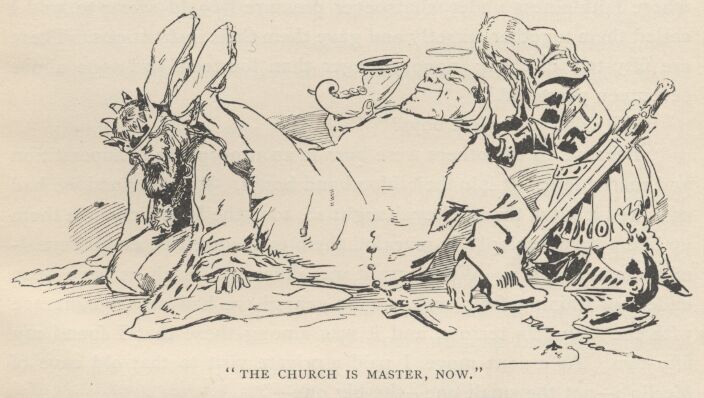
"The Church is master now. The Interdict included you with Mordred; it is not to be removed while you remain alive. The clans are gathering. The Church has gathered all the knights that are left alive, and as soon as you are discovered we shall have business on our hands."
"Stuff! With our deadly scientific war-material; with our hosts of trained—"
"Save your breath—we haven't sixty faithful left!"
"What are you saying? Our schools, our colleges, our vast workshops, our—"
"When those knights come, those establishments will empty themselves and go over to the enemy. Did you think you had educated the superstition out of those people?"
"I certainly did think it."
"Well, then, you may unthink it. They stood every strain easily—until the Interdict. Since then, they merely put on a bold outside—at heart they are quaking. Make up your mind to it—when the armies come, the mask will fall."
"It's hard news. We are lost. They will turn our own science against us."
"No they won't."
"Why?"
"Because I and a handful of the faithful have blocked that game. I'll tell you what I've done, and what moved me to it. Smart as you are, the Church was smarter. It was the Church that sent you cruising—through her servants, the doctors."
"Clarence!"
"It is the truth. I know it. Every officer of your ship was the Church's picked servant, and so was every man of the crew."
"Oh, come!"
"It is just as I tell you. I did not find out these things at once, but I found them out finally. Did you send me verbal information, by the commander of the ship, to the effect that upon his return to you, with supplies, you were going to leave Cadiz—"
"Cadiz! I haven't been at Cadiz at all!"
"—going to leave Cadiz and cruise in distant seas indefinitely, for the health of your family? Did you send me that word?"
"Of course not. I would have written, wouldn't I?"
"Naturally. I was troubled and suspicious. When the commander sailed again I managed to ship a spy with him. I have never heard of vessel or spy since. I gave myself two weeks to hear from you in. Then I resolved to send a ship to Cadiz. There was a reason why I didn't."
"What was that?"
"Our navy had suddenly and mysteriously disappeared! Also, as suddenly and as mysteriously, the railway and telegraph and telephone service ceased, the men all deserted, poles were cut down, the Church laid a ban upon the electric light! I had to be up and doing—and straight off. Your life was safe—nobody in these kingdoms but Merlin would venture to touch such a magician as you without ten thousand men at his back—I had nothing to think of but how to put preparations in the best trim against your coming. I felt safe myself—nobody would be anxious to touch a pet of yours. So this is what I did. From our various works I selected all the men—boys I mean—whose faithfulness under whatsoever pressure I could swear to, and I called them together secretly and gave them their instructions. There are fifty-two of them; none younger than fourteen, and none above seventeen years old."
"Why did you select boys?"
"Because all the others were born in an atmosphere of superstition and reared in it. It is in their blood and bones. We imagined we had educated it out of them; they thought so, too; the Interdict woke them up like a thunderclap! It revealed them to themselves, and it revealed them to me, too. With boys it was different. Such as have been under our training from seven to ten years have had no acquaintance with the Church's terrors, and it was among these that I found my fifty-two. As a next move, I paid a private visit to that old cave of Merlin's—not the small one—the big one—"
"Yes, the one where we secretly established our first great electric plant when I was projecting a miracle."
"Just so. And as that miracle hadn't become necessary then, I thought it might be a good idea to utilize the plant now. I've provisioned the cave for a siege—"
"A good idea, a first-rate idea."
"I think so. I placed four of my boys there as a guard—inside, and out of sight. Nobody was to be hurt—while outside; but any attempt to enter—well, we said just let anybody try it! Then I went out into the hills and uncovered and cut the secret wires which connected your bedroom with the wires that go to the dynamite deposits under all our vast factories, mills, workshops, magazines, etc., and about midnight I and my boys turned out and connected that wire with the cave, and nobody but you and I suspects where the other end of it goes to. We laid it under ground, of course, and it was all finished in a couple of hours or so. We sha'n't have to leave our fortress now when we want to blow up our civilization."
"It was the right move—and the natural one; military necessity, in the changed condition of things. Well, what changes have come! We expected to be besieged in the palace some time or other, but—however, go on."
"Next, we built a wire fence."
"Wire fence?"
"Yes. You dropped the hint of it yourself, two or three years ago."
"Oh, I remember—the time the Church tried her strength against us the first time, and presently thought it wise to wait for a hopefuler season. Well, how have you arranged the fence?"
"I start twelve immensely strong wires—naked, not insulated—from a big dynamo in the cave—dynamo with no brushes except a positive and a negative one—"
"Yes, that's right."
"The wires go out from the cave and fence in a circle of level ground a hundred yards in diameter; they make twelve independent fences, ten feet apart—that is to say, twelve circles within circles—and their ends come into the cave again."
"Right; go on."
"The fences are fastened to heavy oaken posts only three feet apart, and these posts are sunk five feet in the ground."
"That is good and strong."
"Yes. The wires have no ground-connection outside of the cave. They go out from the positive brush of the dynamo; there is a ground-connection through the negative brush; the other ends of the wire return to the cave, and each is grounded independently."
"No, no, that won't do!"
"Why?"
"It's too expensive—uses up force for nothing. You don't want any ground-connection except the one through the negative brush. The other end of every wire must be brought back into the cave and fastened independently, and without any ground-connection. Now, then, observe the economy of it. A cavalry charge hurls itself against the fence; you are using no power, you are spending no money, for there is only one ground-connection till those horses come against the wire; the moment they touch it they form a connection with the negative brush through the ground , and drop dead. Don't you see?—you are using no energy until it is needed; your lightning is there, and ready, like the load in a gun; but it isn't costing you a cent till you touch it off. Oh, yes, the single ground-connection—"
"Of course! I don't know how I overlooked that. It's not only cheaper, but it's more effectual than the other way, for if wires break or get tangled, no harm is done."
"No, especially if we have a tell-tale in the cave and disconnect the broken wire. Well, go on. The gatlings?"
"Yes—that's arranged. In the center of the inner circle, on a spacious platform six feet high, I've grouped a battery of thirteen gatling guns, and provided plenty of ammunition."
"That's it. They command every approach, and when the Church's knights arrive, there's going to be music. The brow of the precipice over the cave—"
"I've got a wire fence there, and a gatling. They won't drop any rocks down on us."
"Well, and the glass-cylinder dynamite torpedoes?"
"That's attended to. It's the prettiest garden that was ever planted. It's a belt forty feet wide, and goes around the outer fence—distance between it and the fence one hundred yards—kind of neutral ground that space is. There isn't a single square yard of that whole belt but is equipped with a torpedo. We laid them on the surface of the ground, and sprinkled a layer of sand over them. It's an innocent looking garden, but you let a man start in to hoe it once, and you'll see."
"You tested the torpedoes?"
"Well, I was going to, but—"
"But what? Why, it's an immense oversight not to apply a—"
"Test? Yes, I know; but they're all right; I laid a few in the public road beyond our lines and they've been tested."
"Oh, that alters the case. Who did it?"
"A Church committee."
"How kind!"
"Yes. They came to command us to make submission. You see they didn't really come to test the torpedoes; that was merely an incident."
"Did the committee make a report?"
"Yes, they made one. You could have heard it a mile."
"Unanimous?"
"That was the nature of it. After that I put up some signs, for the protection of future committees, and we have had no intruders since."
"Clarence, you've done a world of work, and done it perfectly."
"We had plenty of time for it; there wasn't any occasion for hurry."
We sat silent awhile, thinking. Then my mind was made up, and I said:
"Yes, everything is ready; everything is shipshape, no detail is wanting. I know what to do now."
"So do I; sit down and wait."
"No, sir ! rise up and strike !"
"Do you mean it?"
"Yes, indeed! The de fensive isn't in my line, and the of fensive is. That is, when I hold a fair hand—two-thirds as good a hand as the enemy. Oh, yes, we'll rise up and strike; that's our game."
"A hundred to one you are right. When does the performance begin?"
"Now! We'll proclaim the Republic."
"Well, that will precipitate things, sure enough!"
"It will make them buzz, I tell you! England will be a hornets' nest before noon to-morrow, if the Church's hand hasn't lost its cunning—and we know it hasn't. Now you write and I'll dictate thus:
|
"BE IT KNOWN UNTO ALL. Whereas the king having died and left no heir, it becomes my duty to continue the executive authority vested in me, until a government shall have been created and set in motion. The monarchy has lapsed, it no longer exists. By consequence, all political power has reverted to its original source, the people of the nation. With the monarchy, its several adjuncts died also; wherefore there is no longer a nobility, no longer a privileged class, no longer an Established Church; all men are become exactly equal; they are upon one common level, and religion is free. A Republic is hereby proclaimed , as being the natural estate of a nation when other authority has ceased. It is the duty of the British people to meet together immediately, and by their votes elect representatives and deliver into their hands the government." |
I signed it "The Boss," and dated it from Merlin's Cave. Clarence said—
"Why, that tells where we are, and invites them to call right away."
"That is the idea. We strike—by the Proclamation—then it's their innings. Now have the thing set up and printed and posted, right off; that is, give the order; then, if you've got a couple of bicycles handy at the foot of the hill, ho for Merlin's Cave!"
"I shall be ready in ten minutes. What a cyclone there is going to be to-morrow when this piece of paper gets to work!... It's a pleasant old palace, this is; I wonder if we shall ever again—but never mind about that."
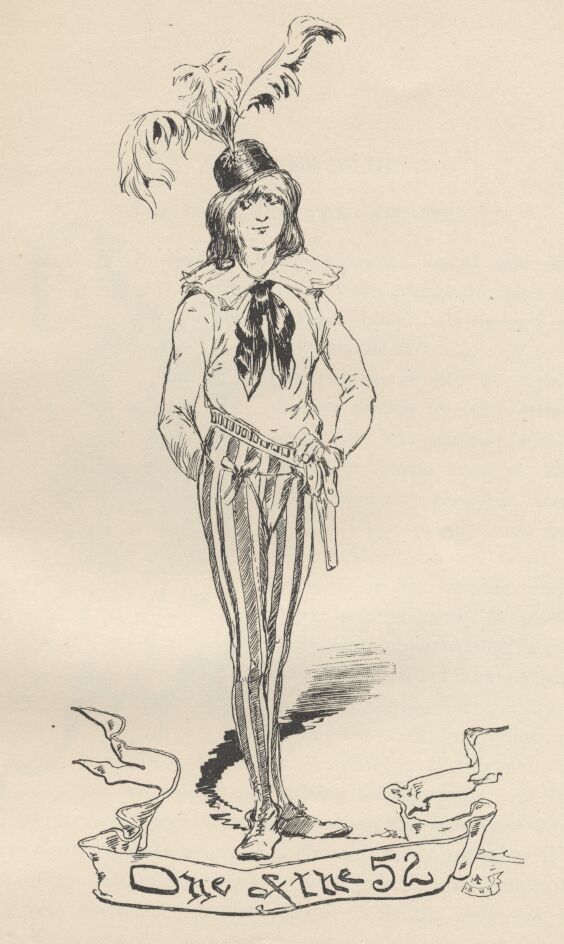
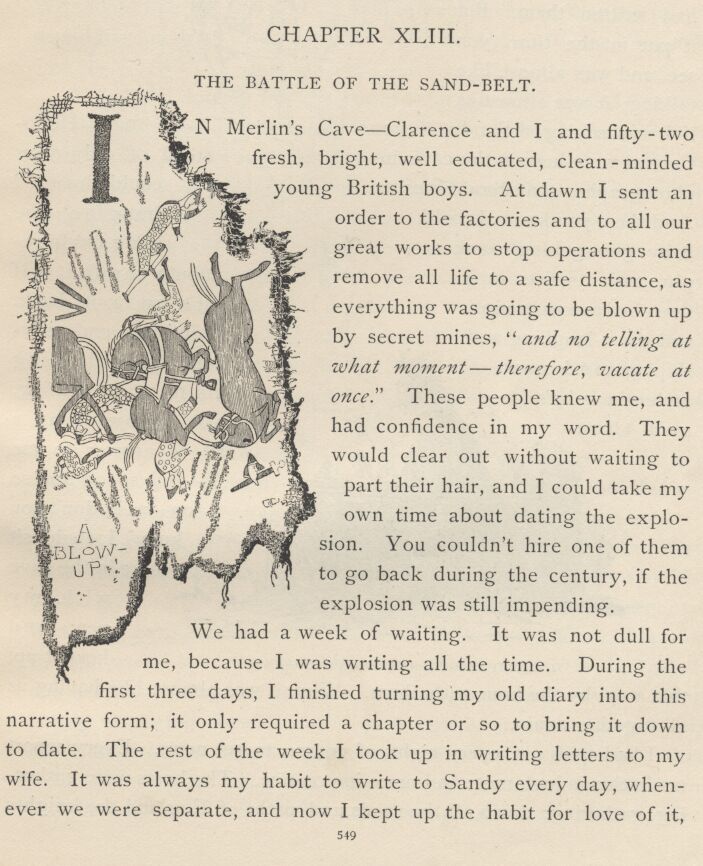
THE BATTLE OF THE SAND BELT
In Merlin's Cave—Clarence and I and fifty-two fresh, bright, well-educated, clean-minded young British boys. At dawn I sent an order to the factories and to all our great works to stop operations and remove all life to a safe distance, as everything was going to be blown up by secret mines, "and no telling at what moment—therefore, vacate at once." These people knew me, and had confidence in my word. They would clear out without waiting to part their hair, and I could take my own time about dating the explosion. You couldn't hire one of them to go back during the century, if the explosion was still impending.
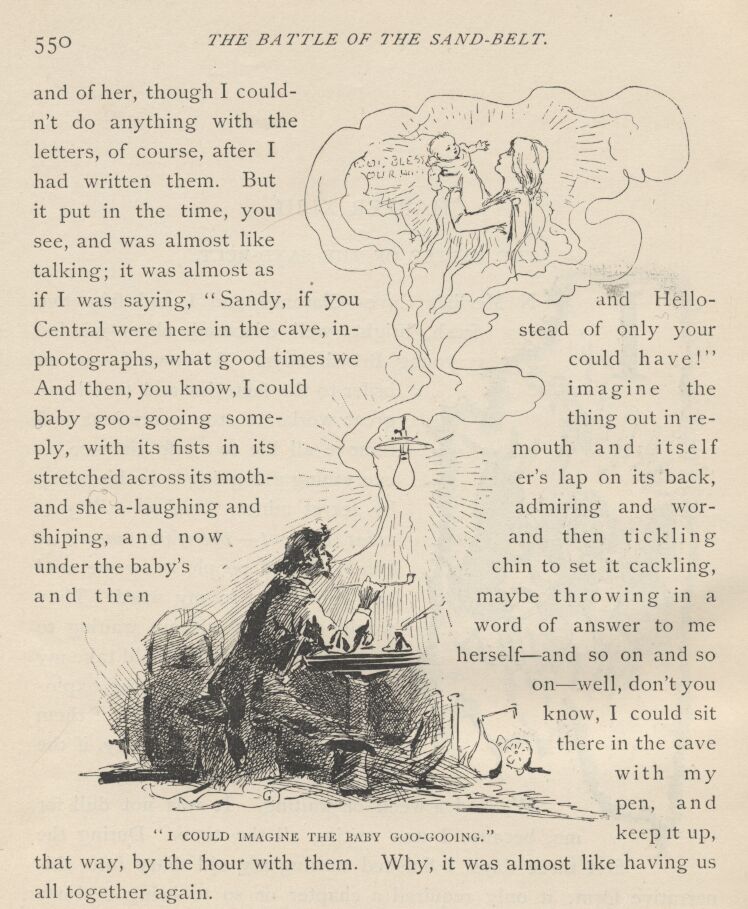
We had a week of waiting. It was not dull for me, because I was writing all the time. During the first three days, I finished turning my old diary into this narrative form; it only required a chapter or so to bring it down to date. The rest of the week I took up in writing letters to my wife. It was always my habit to write to Sandy every day, whenever we were separate, and now I kept up the habit for love of it, and of her, though I couldn't do anything with the letters, of course, after I had written them. But it put in the time, you see, and was almost like talking; it was almost as if I was saying, "Sandy, if you and Hello-Central were here in the cave, instead of only your photographs, what good times we could have!" And then, you know, I could imagine the baby goo-gooing something out in reply, with its fists in its mouth and itself stretched across its mother's lap on its back, and she a-laughing and admiring and worshipping, and now and then tickling under the baby's chin to set it cackling, and then maybe throwing in a word of answer to me herself—and so on and so on—well, don't you know, I could sit there in the cave with my pen, and keep it up, that way, by the hour with them. Why, it was almost like having us all together again.
I had spies out every night, of course, to get news. Every report made things look more and more impressive. The hosts were gathering, gathering; down all the roads and paths of England the knights were riding, and priests rode with them, to hearten these original Crusaders, this being the Church's war. All the nobilities, big and little, were on their way, and all the gentry. This was all as was expected. We should thin out this sort of folk to such a degree that the people would have nothing to do but just step to the front with their republic and—
Ah, what a donkey I was! Toward the end of the week I began to get this large and disenchanting fact through my head: that the mass of the nation had swung their caps and shouted for the republic for about one day, and there an end! The Church, the nobles, and the gentry then turned one grand, all-disapproving frown upon them and shriveled them into sheep! From that moment the sheep had begun to gather to the fold—that is to say, the camps—and offer their valueless lives and their valuable wool to the "righteous cause." Why, even the very men who had lately been slaves were in the "righteous cause," and glorifying it, praying for it, sentimentally slabbering over it, just like all the other commoners. Imagine such human muck as this; conceive of this folly!
Yes, it was now "Death to the Republic!" everywhere—not a dissenting voice. All England was marching against us! Truly, this was more than I had bargained for.
I watched my fifty-two boys narrowly; watched their faces, their walk, their unconscious attitudes: for all these are a language—a language given us purposely that it may betray us in times of emergency, when we have secrets which we want to keep. I knew that that thought would keep saying itself over and over again in their minds and hearts, All England is marching against us! and ever more strenuously imploring attention with each repetition, ever more sharply realizing itself to their imaginations, until even in their sleep they would find no rest from it, but hear the vague and flitting creatures of the dreams say, All England—ALL ENGLAND!—is marching against you! I knew all this would happen; I knew that ultimately the pressure would become so great that it would compel utterance; therefore, I must be ready with an answer at that time—an answer well chosen and tranquilizing.
I was right. The time came. They HAD to speak. Poor lads, it was pitiful to see, they were so pale, so worn, so troubled. At first their spokesman could hardly find voice or words; but he presently got both. This is what he said—and he put it in the neat modern English taught him in my schools:
"We have tried to forget what we are—English boys! We have tried to put reason before sentiment, duty before love; our minds approve, but our hearts reproach us. While apparently it was only the nobility, only the gentry, only the twenty-five or thirty thousand knights left alive out of the late wars, we were of one mind, and undisturbed by any troubling doubt; each and every one of these fifty-two lads who stand here before you, said, 'They have chosen—it is their affair.' But think!—the matter is altered—All England is marching against us ! Oh, sir, consider!—reflect!—these people are our people, they are bone of our bone, flesh of our flesh, we love them—do not ask us to destroy our nation!"
Well, it shows the value of looking ahead, and being ready for a thing when it happens. If I hadn't foreseen this thing and been fixed, that boy would have had me!—I couldn't have said a word. But I was fixed. I said:
"My boys, your hearts are in the right place, you have thought the worthy thought, you have done the worthy thing. You are English boys, you will remain English boys, and you will keep that name unsmirched. Give yourselves no further concern, let your minds be at peace. Consider this: while all England is marching against us, who is in the van? Who, by the commonest rules of war, will march in the front? Answer me."
"The mounted host of mailed knights."
"True. They are thirty thousand strong. Acres deep they will march. Now, observe: none but they will ever strike the sand-belt! Then there will be an episode! Immediately after, the civilian multitude in the rear will retire, to meet business engagements elsewhere. None but nobles and gentry are knights, and none but these will remain to dance to our music after that episode. It is absolutely true that we shall have to fight nobody but these thirty thousand knights. Now speak, and it shall be as you decide. Shall we avoid the battle, retire from the field?"
"NO!!!"
The shout was unanimous and hearty.
"Are you—are you—well, afraid of these thirty thousand knights?"
That joke brought out a good laugh, the boys' troubles vanished away, and they went gaily to their posts. Ah, they were a darling fifty-two! As pretty as girls, too.
I was ready for the enemy now. Let the approaching big day come along—it would find us on deck.
The big day arrived on time. At dawn the sentry on watch in the corral came into the cave and reported a moving black mass under the horizon, and a faint sound which he thought to be military music. Breakfast was just ready; we sat down and ate it.
This over, I made the boys a little speech, and then sent out a detail to man the battery, with Clarence in command of it.
The sun rose presently and sent its unobstructed splendors over the land, and we saw a prodigious host moving slowly toward us, with the steady drift and aligned front of a wave of the sea. Nearer and nearer it came, and more and more sublimely imposing became its aspect; yes, all England was there, apparently. Soon we could see the innumerable banners fluttering, and then the sun struck the sea of armor and set it all aflash. Yes, it was a fine sight; I hadn't ever seen anything to beat it.
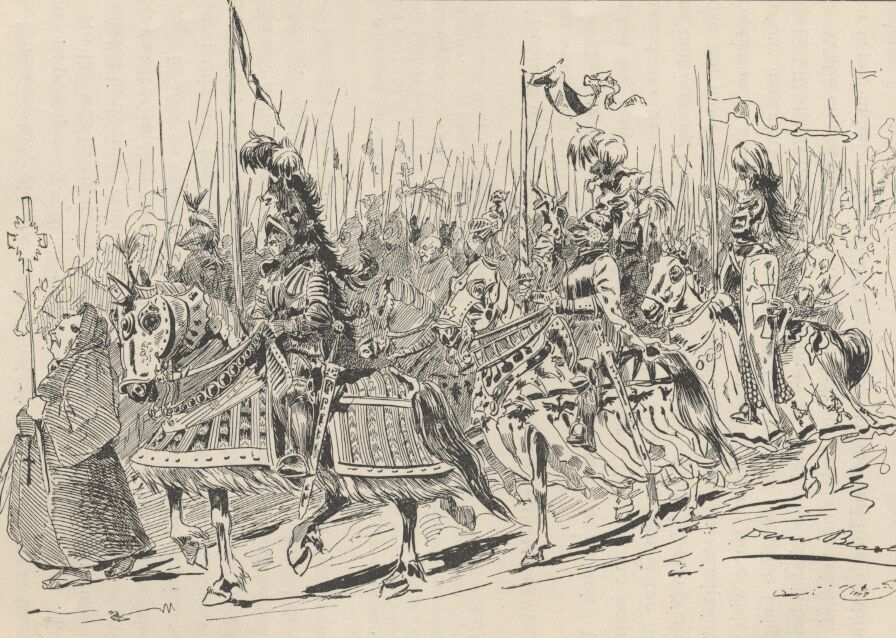
At last we could make out details. All the front ranks, no telling how many acres deep, were horsemen—plumed knights in armor. Suddenly we heard the blare of trumpets; the slow walk burst into a gallop, and then—well, it was wonderful to see! Down swept that vast horse-shoe wave—it approached the sand-belt—my breath stood still; nearer, nearer—the strip of green turf beyond the yellow belt grew narrow—narrower still—became a mere ribbon in front of the horses—then disappeared under their hoofs. Great Scott! Why, the whole front of that host shot into the sky with a thunder-crash, and became a whirling tempest of rags and fragments; and along the ground lay a thick wall of smoke that hid what was left of the multitude from our sight.
Time for the second step in the plan of campaign! I touched a button, and shook the bones of England loose from her spine!
In that explosion all our noble civilization-factories went up in the air and disappeared from the earth. It was a pity, but it was necessary. We could not afford to let the enemy turn our own weapons against us.
Now ensued one of the dullest quarter-hours I had ever endured. We waited in a silent solitude enclosed by our circles of wire, and by a circle of heavy smoke outside of these. We couldn't see over the wall of smoke, and we couldn't see through it. But at last it began to shred away lazily, and by the end of another quarter-hour the land was clear and our curiosity was enabled to satisfy itself. No living creature was in sight! We now perceived that additions had been made to our defenses. The dynamite had dug a ditch more than a hundred feet wide, all around us, and cast up an embankment some twenty-five feet high on both borders of it. As to destruction of life, it was amazing. Moreover, it was beyond estimate. Of course, we could not count the dead, because they did not exist as individuals, but merely as homogeneous protoplasm, with alloys of iron and buttons.
No life was in sight, but necessarily there must have been some wounded in the rear ranks, who were carried off the field under cover of the wall of smoke; there would be sickness among the others—there always is, after an episode like that. But there would be no reinforcements; this was the last stand of the chivalry of England; it was all that was left of the order, after the recent annihilating wars. So I felt quite safe in believing that the utmost force that could for the future be brought against us would be but small; that is, of knights. I therefore issued a congratulatory proclamation to my army in these words:
|
Your General congratulates you! In the pride of his strength and the vanity of his renown, an arrogant enemy came against you. You were ready. The conflict was brief; on your side, glorious. This mighty victory, having been achieved utterly without loss, stands without example in history. So long as the planets shall continue to move in their orbits, the BATTLE OF THE SAND-BELT will not perish out of the memories of men. THE BOSS. |
I read it well, and the applause I got was very gratifying to me. I then wound up with these remarks:
"The war with the English nation, as a nation, is at an end. The nation has retired from the field and the war. Before it can be persuaded to return, war will have ceased. This campaign is the only one that is going to be fought. It will be brief—the briefest in history. Also the most destructive to life, considered from the standpoint of proportion of casualties to numbers engaged. We are done with the nation; henceforth we deal only with the knights. English knights can be killed, but they cannot be conquered. We know what is before us. While one of these men remains alive, our task is not finished, the war is not ended. We will kill them all." [Loud and long continued applause.]
I picketed the great embankments thrown up around our lines by the dynamite explosion—merely a lookout of a couple of boys to announce the enemy when he should appear again.
Next, I sent an engineer and forty men to a point just beyond our lines on the south, to turn a mountain brook that was there, and bring it within our lines and under our command, arranging it in such a way that I could make instant use of it in an emergency. The forty men were divided into two shifts of twenty each, and were to relieve each other every two hours. In ten hours the work was accomplished.
It was nightfall now, and I withdrew my pickets. The one who had had the northern outlook reported a camp in sight, but visible with the glass only. He also reported that a few knights had been feeling their way toward us, and had driven some cattle across our lines, but that the knights themselves had not come very near. That was what I had been expecting. They were feeling us, you see; they wanted to know if we were going to play that red terror on them again. They would grow bolder in the night, perhaps. I believed I knew what project they would attempt, because it was plainly the thing I would attempt myself if I were in their places and as ignorant as they were. I mentioned it to Clarence.
"I think you are right," said he; "it is the obvious thing for them to try."
"Well, then," I said, "if they do it they are doomed."
"Certainly."
"They won't have the slightest show in the world."
"Of course they won't."
"It's dreadful, Clarence. It seems an awful pity."
The thing disturbed me so that I couldn't get any peace of mind for thinking of it and worrying over it. So, at last, to quiet my conscience, I framed this message to the knights:
|
TO THE HONORABLE THE COMMANDER OF THE INSURGENT CHIVALRY OF ENGLAND: YOU fight in vain. We know your strength—if one may call it by that name. We know that at the utmost you cannot bring against us above five and twenty thousand knights. Therefore, you have no chance—none whatever. Reflect: we are well equipped, well fortified, we number 54. Fifty-four what? Men? No, MINDS—the capablest in the world; a force against which mere animal might may no more hope to prevail than may the idle waves of the sea hope to prevail against the granite barriers of England. Be advised. We offer you your lives; for the sake of your families, do not reject the gift. We offer you this chance, and it is the last: throw down your arms; surrender unconditionally to the Republic, and all will be forgiven. (Signed) THE BOSS. |
I read it to Clarence, and said I proposed to send it by a flag of truce. He laughed the sarcastic laugh he was born with, and said:
"Somehow it seems impossible for you to ever fully realize what these nobilities are. Now let us save a little time and trouble. Consider me the commander of the knights yonder. Now, then, you are the flag of truce; approach and deliver me your message, and I will give you your answer."
I humored the idea. I came forward under an imaginary guard of the enemy's soldiers, produced my paper, and read it through. For answer, Clarence struck the paper out of my hand, pursed up a scornful lip and said with lofty disdain:
"Dismember me this animal, and return him in a basket to the base-born knave who sent him; other answer have I none!"
How empty is theory in presence of fact! And this was just fact, and nothing else. It was the thing that would have happened, there was no getting around that. I tore up the paper and granted my mistimed sentimentalities a permanent rest.
Then, to business. I tested the electric signals from the gatling platform to the cave, and made sure that they were all right; I tested and retested those which commanded the fences—these were signals whereby I could break and renew the electric current in each fence independently of the others at will. I placed the brook-connection under the guard and authority of three of my best boys, who would alternate in two-hour watches all night and promptly obey my signal, if I should have occasion to give it—three revolver-shots in quick succession. Sentry-duty was discarded for the night, and the corral left empty of life; I ordered that quiet be maintained in the cave, and the electric lights turned down to a glimmer.
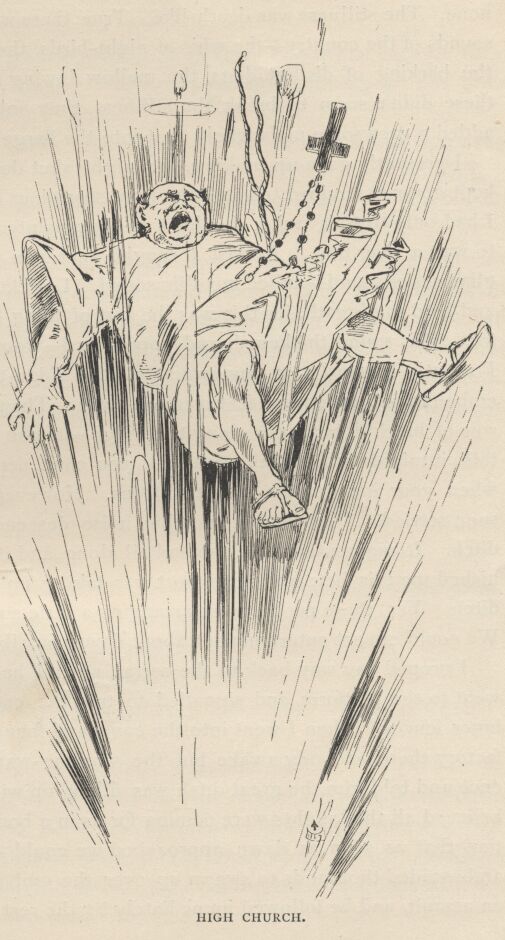
As soon as it was good and dark, I shut off the current from all the fences, and then groped my way out to the embankment bordering our side of the great dynamite ditch. I crept to the top of it and lay there on the slant of the muck to watch. But it was too dark to see anything. As for sounds, there were none. The stillness was deathlike. True, there were the usual night-sounds of the country—the whir of night-birds, the buzzing of insects, the barking of distant dogs, the mellow lowing of far-off kine—but these didn't seem to break the stillness, they only intensified it, and added a grewsome melancholy to it into the bargain.
I presently gave up looking, the night shut down so black, but I kept my ears strained to catch the least suspicious sound, for I judged I had only to wait, and I shouldn't be disappointed. However, I had to wait a long time. At last I caught what you may call in distinct glimpses of sound dulled metallic sound. I pricked up my ears, then, and held my breath, for this was the sort of thing I had been waiting for. This sound thickened, and approached—from toward the north. Presently, I heard it at my own level—the ridge-top of the opposite embankment, a hundred feet or more away. Then I seemed to see a row of black dots appear along that ridge—human heads? I couldn't tell; it mightn't be anything at all; you can't depend on your eyes when your imagination is out of focus. However, the question was soon settled. I heard that metallic noise descending into the great ditch. It augmented fast, it spread all along, and it unmistakably furnished me this fact: an armed host was taking up its quarters in the ditch. Yes, these people were arranging a little surprise party for us. We could expect entertainment about dawn, possibly earlier.
I groped my way back to the corral now; I had seen enough. I went to the platform and signaled to turn the current on to the two inner fences. Then I went into the cave, and found everything satisfactory there—nobody awake but the working-watch. I woke Clarence and told him the great ditch was filling up with men, and that I believed all the knights were coming for us in a body. It was my notion that as soon as dawn approached we could expect the ditch's ambuscaded thousands to swarm up over the embankment and make an assault, and be followed immediately by the rest of their army.
Clarence said:
"They will be wanting to send a scout or two in the dark to make preliminary observations. Why not take the lightning off the outer fences, and give them a chance?"
"I've already done it, Clarence. Did you ever know me to be inhospitable?"
"No, you are a good heart. I want to go and—"
"Be a reception committee? I will go, too."
We crossed the corral and lay down together between the two inside fences. Even the dim light of the cave had disordered our eyesight somewhat, but the focus straightway began to regulate itself and soon it was adjusted for present circumstances. We had had to feel our way before, but we could make out to see the fence posts now. We started a whispered conversation, but suddenly Clarence broke off and said:
"What is that?"
"What is what?"
"That thing yonder."
"What thing—where?"
"There beyond you a little piece—dark something—a dull shape of some kind—against the second fence."
I gazed and he gazed. I said:
"Could it be a man, Clarence?"
"No, I think not. If you notice, it looks a lit—why, it is a man!—leaning on the fence."
"I certainly believe it is; let us go and see."
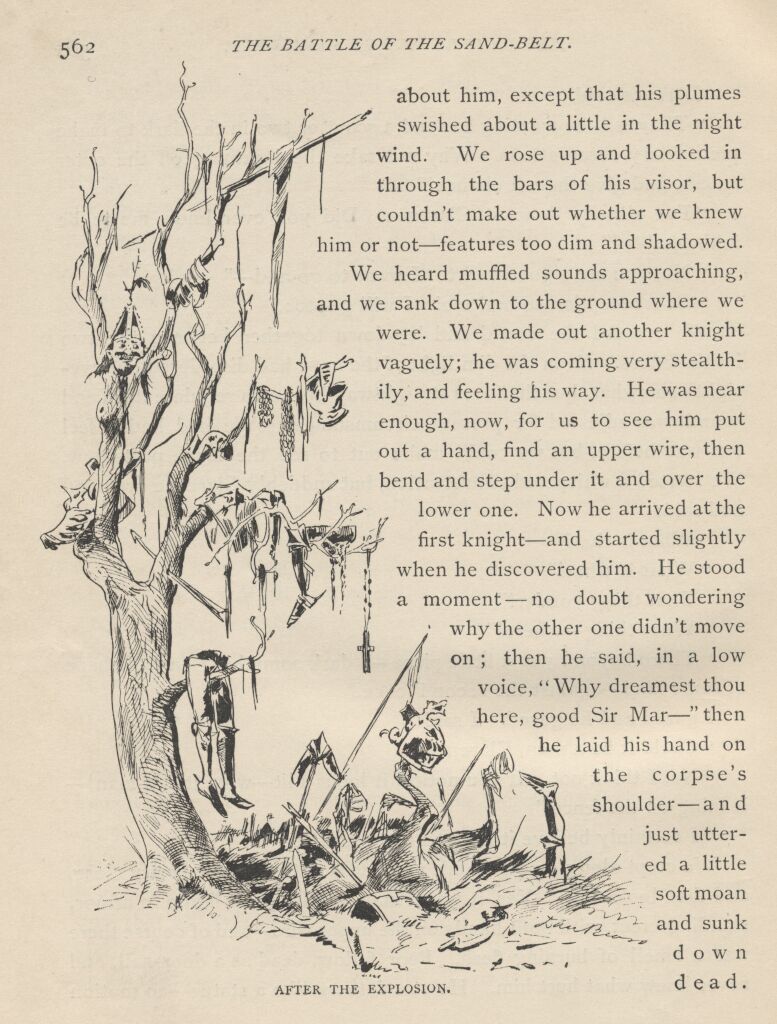
We crept along on our hands and knees until we were pretty close, and then looked up. Yes, it was a man—a dim great figure in armor, standing erect, with both hands on the upper wire—and, of course, there was a smell of burning flesh. Poor fellow, dead as a door-nail, and never knew what hurt him. He stood there like a statue—no motion about him, except that his plumes swished about a little in the night wind. We rose up and looked in through the bars of his visor, but couldn't make out whether we knew him or not—features too dim and shadowed.
We heard muffled sounds approaching, and we sank down to the ground where we were. We made out another knight vaguely; he was coming very stealthily, and feeling his way. He was near enough now for us to see him put out a hand, find an upper wire, then bend and step under it and over the lower one. Now he arrived at the first knight—and started slightly when he discovered him. He stood a moment—no doubt wondering why the other one didn't move on; then he said, in a low voice, "Why dreamest thou here, good Sir Mar—" then he laid his hand on the corpse's shoulder—and just uttered a little soft moan and sunk down dead. Killed by a dead man, you see—killed by a dead friend, in fact. There was something awful about it.
These early birds came scattering along after each other, about one every five minutes in our vicinity, during half an hour. They brought no armor of offense but their swords; as a rule, they carried the sword ready in the hand, and put it forward and found the wires with it. We would now and then see a blue spark when the knight that caused it was so far away as to be invisible to us; but we knew what had happened, all the same; poor fellow, he had touched a charged wire with his sword and been elected. We had brief intervals of grim stillness, interrupted with piteous regularity by the clash made by the falling of an iron-clad; and this sort of thing was going on, right along, and was very creepy there in the dark and lonesomeness.
We concluded to make a tour between the inner fences. We elected to walk upright, for convenience's sake; we argued that if discerned, we should be taken for friends rather than enemies, and in any case we should be out of reach of swords, and these gentry did not seem to have any spears along. Well, it was a curious trip. Everywhere dead men were lying outside the second fence—not plainly visible, but still visible; and we counted fifteen of those pathetic statues—dead knights standing with their hands on the upper wire.
One thing seemed to be sufficiently demonstrated: our current was so tremendous that it killed before the victim could cry out. Pretty soon we detected a muffled and heavy sound, and next moment we guessed what it was. It was a surprise in force coming! whispered Clarence to go and wake the army, and notify it to wait in silence in the cave for further orders. He was soon back, and we stood by the inner fence and watched the silent lightning do its awful work upon that swarming host. One could make out but little of detail; but he could note that a black mass was piling itself up beyond the second fence. That swelling bulk was dead men! Our camp was enclosed with a solid wall of the dead—a bulwark, a breastwork, of corpses, you may say. One terrible thing about this thing was the absence of human voices; there were no cheers, no war cries; being intent upon a surprise, these men moved as noiselessly as they could; and always when the front rank was near enough to their goal to make it proper for them to begin to get a shout ready, of course they struck the fatal line and went down without testifying.
I sent a current through the third fence now; and almost immediately through the fourth and fifth, so quickly were the gaps filled up. I believed the time was come now for my climax; I believed that that whole army was in our trap. Anyway, it was high time to find out. So I touched a button and set fifty electric suns aflame on the top of our precipice.
Land, what a sight! We were enclosed in three walls of dead men! All the other fences were pretty nearly filled with the living, who were stealthily working their way forward through the wires. The sudden glare paralyzed this host, petrified them, you may say, with astonishment; there was just one instant for me to utilize their immobility in, and I didn't lose the chance. You see, in another instant they would have recovered their faculties, then they'd have burst into a cheer and made a rush, and my wires would have gone down before it; but that lost instant lost them their opportunity forever; while even that slight fragment of time was still unspent, I shot the current through all the fences and struck the whole host dead in their tracks! There was a groan you could hear ! It voiced the death-pang of eleven thousand men. It swelled out on the night with awful pathos.
A glance showed that the rest of the enemy—perhaps ten thousand strong—were between us and the encircling ditch, and pressing forward to the assault. Consequently we had them all! and had them past help. Time for the last act of the tragedy. I fired the three appointed revolver shots—which meant:
"Turn on the water!"
There was a sudden rush and roar, and in a minute the mountain brook was raging through the big ditch and creating a river a hundred feet wide and twenty-five deep.
"Stand to your guns, men! Open fire!"
The thirteen gatlings began to vomit death into the fated ten thousand. They halted, they stood their ground a moment against that withering deluge of fire, then they broke, faced about and swept toward the ditch like chaff before a gale. A full fourth part of their force never reached the top of the lofty embankment; the three-fourths reached it and plunged over—to death by drowning.
Within ten short minutes after we had opened fire, armed resistance was totally annihilated, the campaign was ended, we fifty-four were masters of England. Twenty-five thousand men lay dead around us.
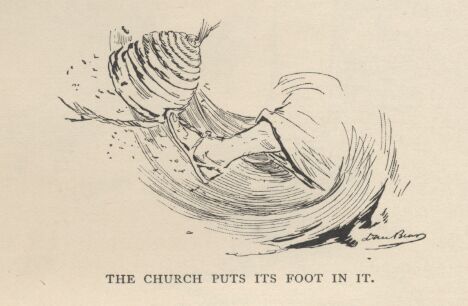
But how treacherous is fortune! In a little while—say an hour—happened a thing, by my own fault, which—but I have no heart to write that. Let the record end here.
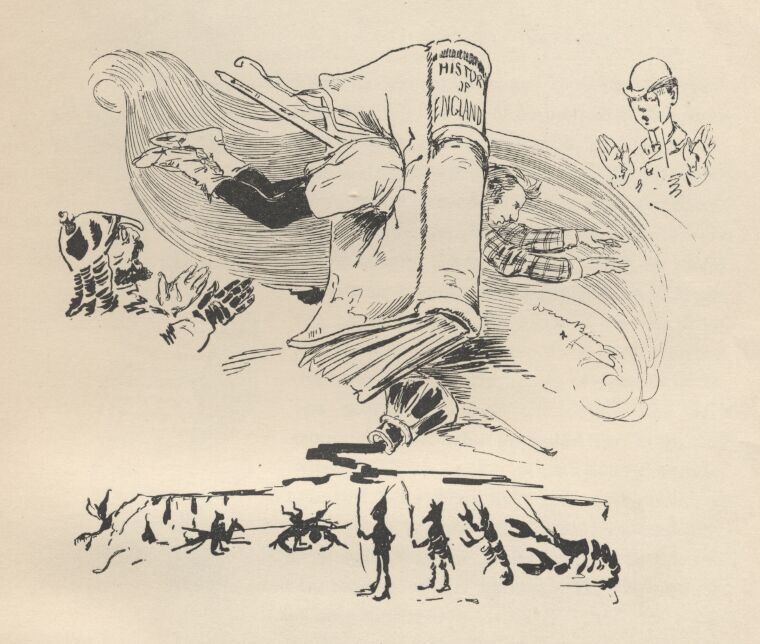
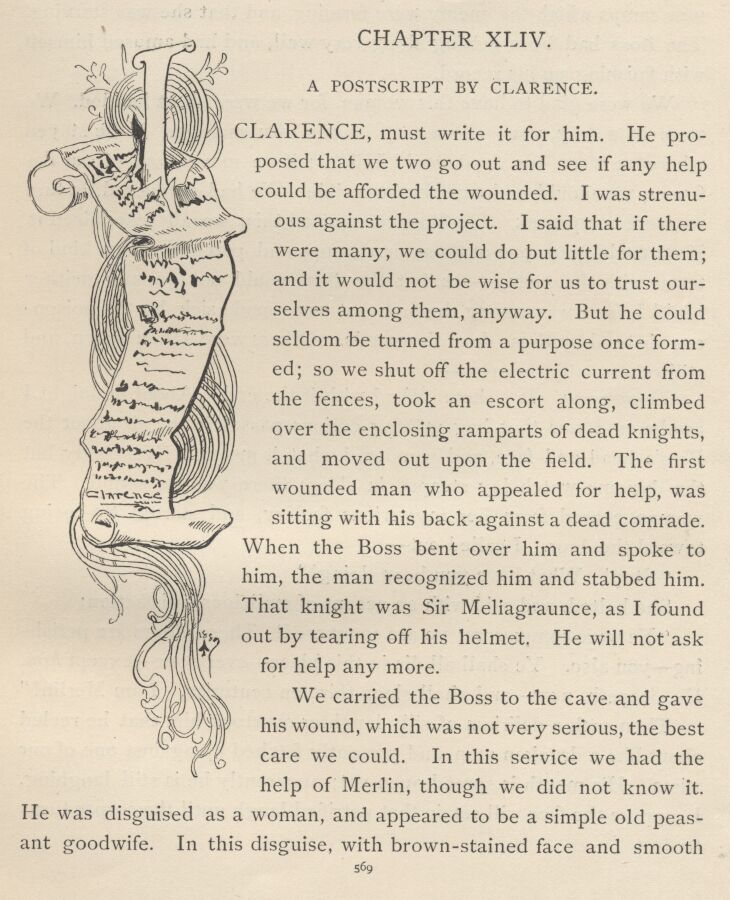
A POSTSCRIPT BY CLARENCE
I, Clarence, must write it for him. He proposed that we two go out and see if any help could be accorded the wounded. I was strenuous against the project. I said that if there were many, we could do but little for them; and it would not be wise for us to trust ourselves among them, anyway. But he could seldom be turned from a purpose once formed; so we shut off the electric current from the fences, took an escort along, climbed over the enclosing ramparts of dead knights, and moved out upon the field. The first wounded mall who appealed for help was sitting with his back against a dead comrade. When The Boss bent over him and spoke to him, the man recognized him and stabbed him. That knight was Sir Meliagraunce, as I found out by tearing off his helmet. He will not ask for help any more.
We carried The Boss to the cave and gave his wound, which was not very serious, the best care we could. In this service we had the help of Merlin, though we did not know it. He was disguised as a woman, and appeared to be a simple old peasant goodwife. In this disguise, with brown-stained face and smooth shaven, he had appeared a few days after The Boss was hurt and offered to cook for us, saying her people had gone off to join certain new camps which the enemy were forming, and that she was starving. The Boss had been getting along very well, and had amused himself with finishing up his record.
We were glad to have this woman, for we were short handed. We were in a trap, you see—a trap of our own making. If we stayed where we were, our dead would kill us; if we moved out of our defenses, we should no longer be invincible. We had conquered; in turn we were conquered. The Boss recognized this; we all recognized it. If we could go to one of those new camps and patch up some kind of terms with the enemy—yes, but The Boss could not go, and neither could I, for I was among the first that were made sick by the poisonous air bred by those dead thousands. Others were taken down, and still others. To-morrow—
To-morrow. It is here. And with it the end. About midnight I awoke, and saw that hag making curious passes in the air about The Boss's head and face, and wondered what it meant. Everybody but the dynamo-watch lay steeped in sleep; there was no sound. The woman ceased from her mysterious foolery, and started tip-toeing toward the door. I called out:
"Stop! What have you been doing?"
She halted, and said with an accent of malicious satisfaction:
"Ye were conquerors; ye are conquered! These others are perishing—you also. Ye shall all die in this place—every one—except him . He sleepeth now—and shall sleep thirteen centuries. I am Merlin!"
Then such a delirium of silly laughter overtook him that he reeled about like a drunken man, and presently fetched up against one of our wires. His mouth is spread open yet; apparently he is still laughing. I suppose the face will retain that petrified laugh until the corpse turns to dust.
The Boss has never stirred—sleeps like a stone. If he does not wake to-day we shall understand what kind of a sleep it is, and his body will then be borne to a place in one of the remote recesses of the cave where none will ever find it to desecrate it. As for the rest of us—well, it is agreed that if any one of us ever escapes alive from this place, he will write the fact here, and loyally hide this Manuscript with The Boss, our dear good chief, whose property it is, be he alive or dead.
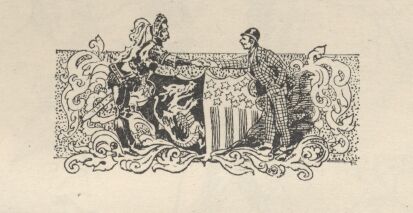
THE END OF THE MANUSCRIPT
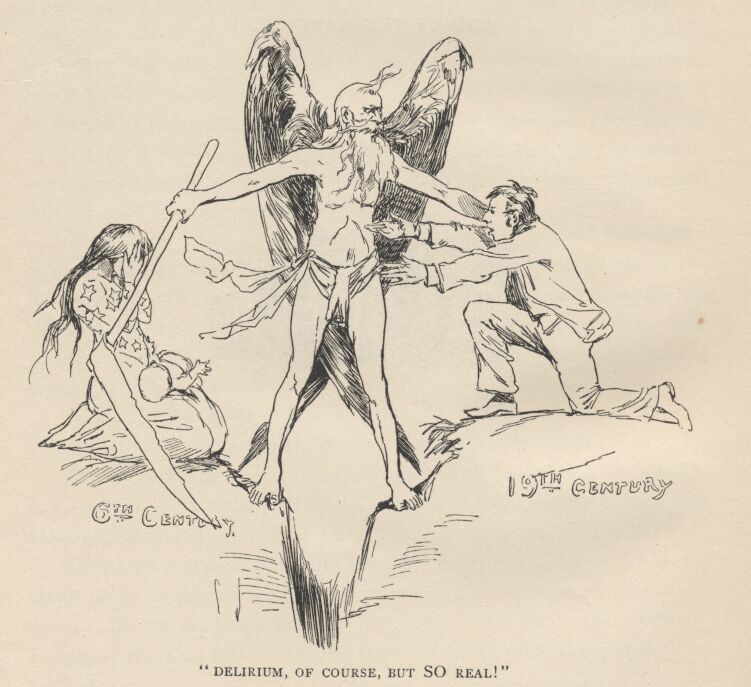
FINAL P.S. BY M.T.
The dawn was come when I laid the Manuscript aside. The rain had almost ceased, the world was gray and sad, the exhausted storm was sighing and sobbing itself to rest. I went to the stranger's room, and listened at his door, which was slightly ajar. I could hear his voice, and so I knocked. There was no answer, but I still heard the voice. I peeped in. The man lay on his back in bed, talking brokenly but with spirit, and punctuating with his arms, which he thrashed about, restlessly, as sick people do in delirium. I slipped in softly and bent over him. His mutterings and ejaculations went on. I spoke—merely a word, to call his attention. His glassy eyes and his ashy face were alight in an instant with pleasure, gratitude, gladness, welcome:
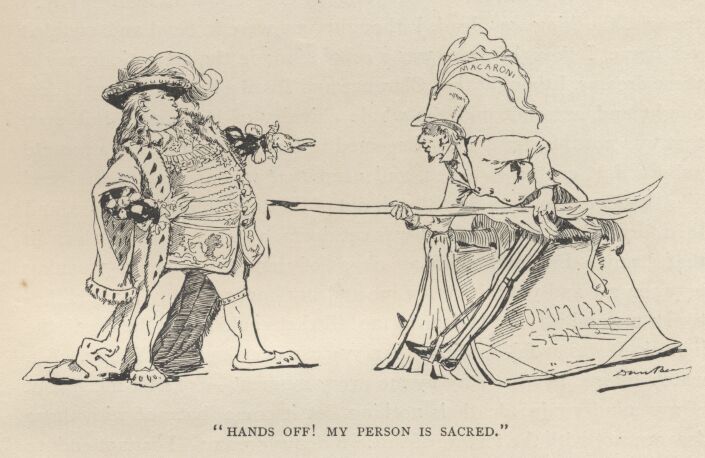
"Oh, Sandy, you are come at last—how I have longed for you! Sit by me—do not leave me—never leave me again, Sandy, never again. Where is your hand?—give it me, dear, let me hold it—there—now all is well, all is peace, and I am happy again—we are happy again, isn't it so, Sandy? You are so dim, so vague, you are but a mist, a cloud, but you are here , and that is blessedness sufficient; and I have your hand; don't take it away—it is for only a little while, I shall not require it long.... Was that the child?... Hello-Central!... she doesn't answer. Asleep, perhaps? Bring her when she wakes, and let me touch her hands, her face, her hair, and tell her good-bye.... Sandy! Yes, you are there. I lost myself a moment, and I thought you were gone.... Have I been sick long? It must be so; it seems months to me. And such dreams! such strange and awful dreams, Sandy! Dreams that were as real as reality—delirium, of course, but so real! Why, I thought the king was dead, I thought you were in Gaul and couldn't get home, I thought there was a revolution; in the fantastic frenzy of these dreams, I thought that Clarence and I and a handful of my cadets fought and exterminated the whole chivalry of England! But even that was not the strangest. I seemed to be a creature out of a remote unborn age, centuries hence, and even that was as real as the rest! Yes, I seemed to have flown back out of that age into this of ours, and then forward to it again, and was set down, a stranger and forlorn in that strange England, with an abyss of thirteen centuries yawning between me and you! between me and my home and my friends! between me and all that is dear to me, all that could make life worth the living! It was awful—awfuler than you can ever imagine, Sandy. Ah, watch by me, Sandy—stay by me every moment—don't let me go out of my mind again; death is nothing, let it come, but not with those dreams, not with the torture of those hideous dreams—I cannot endure that again.... Sandy?..."
He lay muttering incoherently some little time; then for a time he lay silent, and apparently sinking away toward death. Presently his fingers began to pick busily at the coverlet, and by that sign I knew that his end was at hand with the first suggestion of the death-rattle in his throat he started up slightly, and seemed to listen: then he said:
"A bugle?... It is the king! The drawbridge, there! Man the battlements!—turn out the—"
He was getting up his last "effect"; but he never finished it.
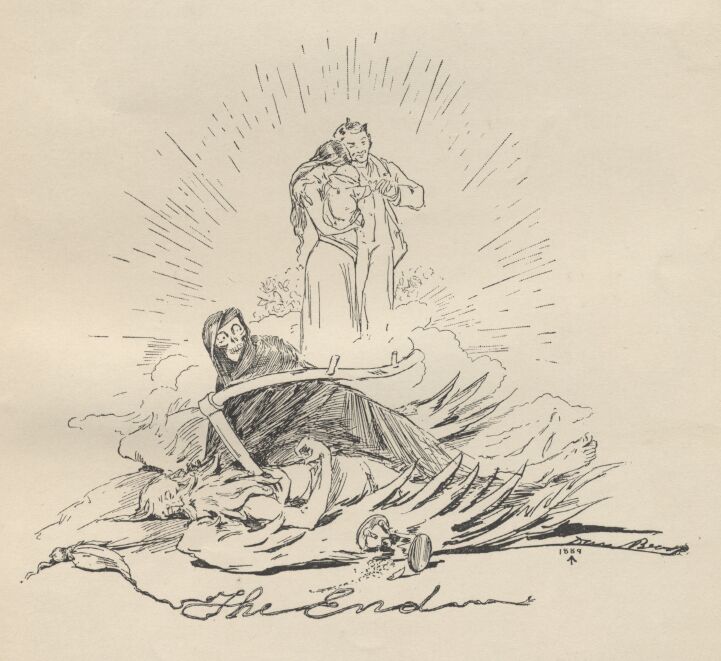
End of the Project Gutenberg EBook of A Connecticut Yankee in King Arthur's
Court, Part 9., by Mark Twain (Samuel Clemens)
*** END OF THIS PROJECT GUTENBERG EBOOK CONNECTICUT YANKEE ***
***** This file should be named 7250-h.htm or 7250-h.zip *****
This and all associated files of various formats will be found in:
https://www.gutenberg.org/7/2/5/7250/
Produced by David Widger
Updated editions will replace the previous one--the old editions
will be renamed.
Creating the works from public domain print editions means that no
one owns a United States copyright in these works, so the Foundation
(and you!) can copy and distribute it in the United States without
permission and without paying copyright royalties. Special rules,
set forth in the General Terms of Use part of this license, apply to
copying and distributing Project Gutenberg-tm electronic works to
protect the PROJECT GUTENBERG-tm concept and trademark. Project
Gutenberg is a registered trademark, and may not be used if you
charge for the eBooks, unless you receive specific permission. If you
do not charge anything for copies of this eBook, complying with the
rules is very easy. You may use this eBook for nearly any purpose
such as creation of derivative works, reports, performances and
research. They may be modified and printed and given away--you may do
practically ANYTHING with public domain eBooks. Redistribution is
subject to the trademark license, especially commercial
redistribution.
*** START: FULL LICENSE ***
THE FULL PROJECT GUTENBERG LICENSE
PLEASE READ THIS BEFORE YOU DISTRIBUTE OR USE THIS WORK
To protect the Project Gutenberg-tm mission of promoting the free
distribution of electronic works, by using or distributing this work
(or any other work associated in any way with the phrase "Project
Gutenberg"), you agree to comply with all the terms of the Full Project
Gutenberg-tm License (available with this file or online at
https://gutenberg.org/license).
Section 1. General Terms of Use and Redistributing Project Gutenberg-tm
electronic works
1.A. By reading or using any part of this Project Gutenberg-tm
electronic work, you indicate that you have read, understand, agree to
and accept all the terms of this license and intellectual property
(trademark/copyright) agreement. If you do not agree to abide by all
the terms of this agreement, you must cease using and return or destroy
all copies of Project Gutenberg-tm electronic works in your possession.
If you paid a fee for obtaining a copy of or access to a Project
Gutenberg-tm electronic work and you do not agree to be bound by the
terms of this agreement, you may obtain a refund from the person or
entity to whom you paid the fee as set forth in paragraph 1.E.8.
1.B. "Project Gutenberg" is a registered trademark. It may only be
used on or associated in any way with an electronic work by people who
agree to be bound by the terms of this agreement. There are a few
things that you can do with most Project Gutenberg-tm electronic works
even without complying with the full terms of this agreement. See
paragraph 1.C below. There are a lot of things you can do with Project
Gutenberg-tm electronic works if you follow the terms of this agreement
and help preserve free future access to Project Gutenberg-tm electronic
works. See paragraph 1.E below.
1.C. The Project Gutenberg Literary Archive Foundation ("the Foundation"
or PGLAF), owns a compilation copyright in the collection of Project
Gutenberg-tm electronic works. Nearly all the individual works in the
collection are in the public domain in the United States. If an
individual work is in the public domain in the United States and you are
located in the United States, we do not claim a right to prevent you from
copying, distributing, performing, displaying or creating derivative
works based on the work as long as all references to Project Gutenberg
are removed. Of course, we hope that you will support the Project
Gutenberg-tm mission of promoting free access to electronic works by
freely sharing Project Gutenberg-tm works in compliance with the terms of
this agreement for keeping the Project Gutenberg-tm name associated with
the work. You can easily comply with the terms of this agreement by
keeping this work in the same format with its attached full Project
Gutenberg-tm License when you share it without charge with others.
1.D. The copyright laws of the place where you are located also govern
what you can do with this work. Copyright laws in most countries are in
a constant state of change. If you are outside the United States, check
the laws of your country in addition to the terms of this agreement
before downloading, copying, displaying, performing, distributing or
creating derivative works based on this work or any other Project
Gutenberg-tm work. The Foundation makes no representations concerning
the copyright status of any work in any country outside the United
States.
1.E. Unless you have removed all references to Project Gutenberg:
1.E.1. The following sentence, with active links to, or other immediate
access to, the full Project Gutenberg-tm License must appear prominently
whenever any copy of a Project Gutenberg-tm work (any work on which the
phrase "Project Gutenberg" appears, or with which the phrase "Project
Gutenberg" is associated) is accessed, displayed, performed, viewed,
copied or distributed:
This eBook is for the use of anyone anywhere at no cost and with
almost no restrictions whatsoever. You may copy it, give it away or
re-use it under the terms of the Project Gutenberg License included
with this eBook or online at www.gutenberg.org
1.E.2. If an individual Project Gutenberg-tm electronic work is derived
from the public domain (does not contain a notice indicating that it is
posted with permission of the copyright holder), the work can be copied
and distributed to anyone in the United States without paying any fees
or charges. If you are redistributing or providing access to a work
with the phrase "Project Gutenberg" associated with or appearing on the
work, you must comply either with the requirements of paragraphs 1.E.1
through 1.E.7 or obtain permission for the use of the work and the
Project Gutenberg-tm trademark as set forth in paragraphs 1.E.8 or
1.E.9.
1.E.3. If an individual Project Gutenberg-tm electronic work is posted
with the permission of the copyright holder, your use and distribution
must comply with both paragraphs 1.E.1 through 1.E.7 and any additional
terms imposed by the copyright holder. Additional terms will be linked
to the Project Gutenberg-tm License for all works posted with the
permission of the copyright holder found at the beginning of this work.
1.E.4. Do not unlink or detach or remove the full Project Gutenberg-tm
License terms from this work, or any files containing a part of this
work or any other work associated with Project Gutenberg-tm.
1.E.5. Do not copy, display, perform, distribute or redistribute this
electronic work, or any part of this electronic work, without
prominently displaying the sentence set forth in paragraph 1.E.1 with
active links or immediate access to the full terms of the Project
Gutenberg-tm License.
1.E.6. You may convert to and distribute this work in any binary,
compressed, marked up, nonproprietary or proprietary form, including any
word processing or hypertext form. However, if you provide access to or
distribute copies of a Project Gutenberg-tm work in a format other than
"Plain Vanilla ASCII" or other format used in the official version
posted on the official Project Gutenberg-tm web site (www.gutenberg.org),
you must, at no additional cost, fee or expense to the user, provide a
copy, a means of exporting a copy, or a means of obtaining a copy upon
request, of the work in its original "Plain Vanilla ASCII" or other
form. Any alternate format must include the full Project Gutenberg-tm
License as specified in paragraph 1.E.1.
1.E.7. Do not charge a fee for access to, viewing, displaying,
performing, copying or distributing any Project Gutenberg-tm works
unless you comply with paragraph 1.E.8 or 1.E.9.
1.E.8. You may charge a reasonable fee for copies of or providing
access to or distributing Project Gutenberg-tm electronic works provided
that
- You pay a royalty fee of 20% of the gross profits you derive from
the use of Project Gutenberg-tm works calculated using the method
you already use to calculate your applicable taxes. The fee is
owed to the owner of the Project Gutenberg-tm trademark, but he
has agreed to donate royalties under this paragraph to the
Project Gutenberg Literary Archive Foundation. Royalty payments
must be paid within 60 days following each date on which you
prepare (or are legally required to prepare) your periodic tax
returns. Royalty payments should be clearly marked as such and
sent to the Project Gutenberg Literary Archive Foundation at the
address specified in Section 4, "Information about donations to
the Project Gutenberg Literary Archive Foundation."
- You provide a full refund of any money paid by a user who notifies
you in writing (or by e-mail) within 30 days of receipt that s/he
does not agree to the terms of the full Project Gutenberg-tm
License. You must require such a user to return or
destroy all copies of the works possessed in a physical medium
and discontinue all use of and all access to other copies of
Project Gutenberg-tm works.
- You provide, in accordance with paragraph 1.F.3, a full refund of any
money paid for a work or a replacement copy, if a defect in the
electronic work is discovered and reported to you within 90 days
of receipt of the work.
- You comply with all other terms of this agreement for free
distribution of Project Gutenberg-tm works.
1.E.9. If you wish to charge a fee or distribute a Project Gutenberg-tm
electronic work or group of works on different terms than are set
forth in this agreement, you must obtain permission in writing from
both the Project Gutenberg Literary Archive Foundation and Michael
Hart, the owner of the Project Gutenberg-tm trademark. Contact the
Foundation as set forth in Section 3 below.
1.F.
1.F.1. Project Gutenberg volunteers and employees expend considerable
effort to identify, do copyright research on, transcribe and proofread
public domain works in creating the Project Gutenberg-tm
collection. Despite these efforts, Project Gutenberg-tm electronic
works, and the medium on which they may be stored, may contain
"Defects," such as, but not limited to, incomplete, inaccurate or
corrupt data, transcription errors, a copyright or other intellectual
property infringement, a defective or damaged disk or other medium, a
computer virus, or computer codes that damage or cannot be read by
your equipment.
1.F.2. LIMITED WARRANTY, DISCLAIMER OF DAMAGES - Except for the "Right
of Replacement or Refund" described in paragraph 1.F.3, the Project
Gutenberg Literary Archive Foundation, the owner of the Project
Gutenberg-tm trademark, and any other party distributing a Project
Gutenberg-tm electronic work under this agreement, disclaim all
liability to you for damages, costs and expenses, including legal
fees. YOU AGREE THAT YOU HAVE NO REMEDIES FOR NEGLIGENCE, STRICT
LIABILITY, BREACH OF WARRANTY OR BREACH OF CONTRACT EXCEPT THOSE
PROVIDED IN PARAGRAPH F3. YOU AGREE THAT THE FOUNDATION, THE
TRADEMARK OWNER, AND ANY DISTRIBUTOR UNDER THIS AGREEMENT WILL NOT BE
LIABLE TO YOU FOR ACTUAL, DIRECT, INDIRECT, CONSEQUENTIAL, PUNITIVE OR
INCIDENTAL DAMAGES EVEN IF YOU GIVE NOTICE OF THE POSSIBILITY OF SUCH
DAMAGE.
1.F.3. LIMITED RIGHT OF REPLACEMENT OR REFUND - If you discover a
defect in this electronic work within 90 days of receiving it, you can
receive a refund of the money (if any) you paid for it by sending a
written explanation to the person you received the work from. If you
received the work on a physical medium, you must return the medium with
your written explanation. The person or entity that provided you with
the defective work may elect to provide a replacement copy in lieu of a
refund. If you received the work electronically, the person or entity
providing it to you may choose to give you a second opportunity to
receive the work electronically in lieu of a refund. If the second copy
is also defective, you may demand a refund in writing without further
opportunities to fix the problem.
1.F.4. Except for the limited right of replacement or refund set forth
in paragraph 1.F.3, this work is provided to you 'AS-IS' WITH NO OTHER
WARRANTIES OF ANY KIND, EXPRESS OR IMPLIED, INCLUDING BUT NOT LIMITED TO
WARRANTIES OF MERCHANTIBILITY OR FITNESS FOR ANY PURPOSE.
1.F.5. Some states do not allow disclaimers of certain implied
warranties or the exclusion or limitation of certain types of damages.
If any disclaimer or limitation set forth in this agreement violates the
law of the state applicable to this agreement, the agreement shall be
interpreted to make the maximum disclaimer or limitation permitted by
the applicable state law. The invalidity or unenforceability of any
provision of this agreement shall not void the remaining provisions.
1.F.6. INDEMNITY - You agree to indemnify and hold the Foundation, the
trademark owner, any agent or employee of the Foundation, anyone
providing copies of Project Gutenberg-tm electronic works in accordance
with this agreement, and any volunteers associated with the production,
promotion and distribution of Project Gutenberg-tm electronic works,
harmless from all liability, costs and expenses, including legal fees,
that arise directly or indirectly from any of the following which you do
or cause to occur: (a) distribution of this or any Project Gutenberg-tm
work, (b) alteration, modification, or additions or deletions to any
Project Gutenberg-tm work, and (c) any Defect you cause.
Section 2. Information about the Mission of Project Gutenberg-tm
Project Gutenberg-tm is synonymous with the free distribution of
electronic works in formats readable by the widest variety of computers
including obsolete, old, middle-aged and new computers. It exists
because of the efforts of hundreds of volunteers and donations from
people in all walks of life.
Volunteers and financial support to provide volunteers with the
assistance they need, is critical to reaching Project Gutenberg-tm's
goals and ensuring that the Project Gutenberg-tm collection will
remain freely available for generations to come. In 2001, the Project
Gutenberg Literary Archive Foundation was created to provide a secure
and permanent future for Project Gutenberg-tm and future generations.
To learn more about the Project Gutenberg Literary Archive Foundation
and how your efforts and donations can help, see Sections 3 and 4
and the Foundation web page at https://www.pglaf.org.
Section 3. Information about the Project Gutenberg Literary Archive
Foundation
The Project Gutenberg Literary Archive Foundation is a non profit
501(c)(3) educational corporation organized under the laws of the
state of Mississippi and granted tax exempt status by the Internal
Revenue Service. The Foundation's EIN or federal tax identification
number is 64-6221541. Its 501(c)(3) letter is posted at
https://pglaf.org/fundraising. Contributions to the Project Gutenberg
Literary Archive Foundation are tax deductible to the full extent
permitted by U.S. federal laws and your state's laws.
The Foundation's principal office is located at 4557 Melan Dr. S.
Fairbanks, AK, 99712., but its volunteers and employees are scattered
throughout numerous locations. Its business office is located at
809 North 1500 West, Salt Lake City, UT 84116, (801) 596-1887, email
[email protected]. Email contact links and up to date contact
information can be found at the Foundation's web site and official
page at https://pglaf.org
For additional contact information:
Dr. Gregory B. Newby
Chief Executive and Director
[email protected]
Section 4. Information about Donations to the Project Gutenberg
Literary Archive Foundation
Project Gutenberg-tm depends upon and cannot survive without wide
spread public support and donations to carry out its mission of
increasing the number of public domain and licensed works that can be
freely distributed in machine readable form accessible by the widest
array of equipment including outdated equipment. Many small donations
($1 to $5,000) are particularly important to maintaining tax exempt
status with the IRS.
The Foundation is committed to complying with the laws regulating
charities and charitable donations in all 50 states of the United
States. Compliance requirements are not uniform and it takes a
considerable effort, much paperwork and many fees to meet and keep up
with these requirements. We do not solicit donations in locations
where we have not received written confirmation of compliance. To
SEND DONATIONS or determine the status of compliance for any
particular state visit https://pglaf.org
While we cannot and do not solicit contributions from states where we
have not met the solicitation requirements, we know of no prohibition
against accepting unsolicited donations from donors in such states who
approach us with offers to donate.
International donations are gratefully accepted, but we cannot make
any statements concerning tax treatment of donations received from
outside the United States. U.S. laws alone swamp our small staff.
Please check the Project Gutenberg Web pages for current donation
methods and addresses. Donations are accepted in a number of other
ways including including checks, online payments and credit card
donations. To donate, please visit: https://pglaf.org/donate
Section 5. General Information About Project Gutenberg-tm electronic
works.
Professor Michael S. Hart was the originator of the Project Gutenberg-tm
concept of a library of electronic works that could be freely shared
with anyone. For thirty years, he produced and distributed Project
Gutenberg-tm eBooks with only a loose network of volunteer support.
Project Gutenberg-tm eBooks are often created from several printed
editions, all of which are confirmed as Public Domain in the U.S.
unless a copyright notice is included. Thus, we do not necessarily
keep eBooks in compliance with any particular paper edition.
Most people start at our Web site which has the main PG search facility:
https://www.gutenberg.org
This Web site includes information about Project Gutenberg-tm,
including how to make donations to the Project Gutenberg Literary
Archive Foundation, how to help produce our new eBooks, and how to
subscribe to our email newsletter to hear about new eBooks.